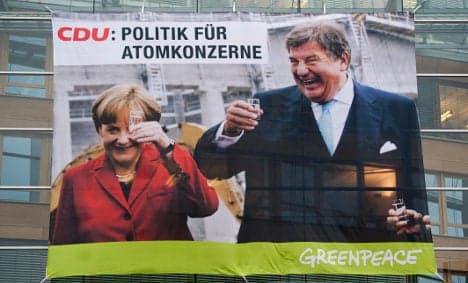Activists scale CDU roof over nuclear extension

Greenpeace activists occupied the roof of the conservative Christian Democratic Union's party headquarters in Berlin on Thursday, hanging an enormous banner in protest of a planned parliamentary vote to extend the life of Germany’s nuclear reactors.
About a dozen Greenpeace protestors climbed to the top of the CDU building, unrolling the banner that read “CDU – Policies for nuclear power companies.” The banner’s image showed the party’s leader Chancellor Angela Merkel toasting schnapps glasses with the head of energy company RWE, Jürgen Großmann.
The environmentalists accused the CDU of catering to the country’s energy giants RWE, EON, EnBW and Vattenfall, and urged MPs to vote against the nuclear power plant extension.
“Today we will see if CDU policies are for the people of this country or the four big nuclear power companies,” Greenpeace energy expert Tobias Münchmeyer said.
Meanwhile hundreds of other protestors gathered outside of the Reichstag parliamentary building early on Thursday morning to build a human chain in protest of the 14-year extension.
Nuclear power will remain part of Germany’s energy supply for decades to come under the controversial extension of atomic reactors’ lifespans. The measure is likely to be approved by Merkel's centre-right coalition of conservatives and pro-business Free Democrats despite widespread public scepticism.
Under the plan, the seven reactors that began operating before 1980 will be extended by eight years, and the 10 newer reactors will continue for 14 years.
That means the last reactor will not be decommissioned until at least 2036.
Nuclear power could remain part of Germany’s energy mix for even longer: if a reactor needs to be closed down prematurely, its running time can be transferred to another, younger reactor.
The government has sold the extension as a bridge while renewable energy technology is further developed, with the goal to make renewables the dominant power source by 2050.
But details of the goals on renewable energy remain vague and a plan for mandatory green-friendly renovations to buildings has been ditched. Merkel has hailed the plan as a sound, long-term energy policy.
Under a previous government, the centre-left Social Democrats and environmentalist Greens agreed to phase out nuclear reactors by 2022. Meanwhile experts have voiced repeated concerns over the safety of the country's ageing nuclear power plants.
DPA/ka
Comments
See Also
About a dozen Greenpeace protestors climbed to the top of the CDU building, unrolling the banner that read “CDU – Policies for nuclear power companies.” The banner’s image showed the party’s leader Chancellor Angela Merkel toasting schnapps glasses with the head of energy company RWE, Jürgen Großmann.
The environmentalists accused the CDU of catering to the country’s energy giants RWE, EON, EnBW and Vattenfall, and urged MPs to vote against the nuclear power plant extension.
“Today we will see if CDU policies are for the people of this country or the four big nuclear power companies,” Greenpeace energy expert Tobias Münchmeyer said.
Meanwhile hundreds of other protestors gathered outside of the Reichstag parliamentary building early on Thursday morning to build a human chain in protest of the 14-year extension.
Nuclear power will remain part of Germany’s energy supply for decades to come under the controversial extension of atomic reactors’ lifespans. The measure is likely to be approved by Merkel's centre-right coalition of conservatives and pro-business Free Democrats despite widespread public scepticism.
Under the plan, the seven reactors that began operating before 1980 will be extended by eight years, and the 10 newer reactors will continue for 14 years.
That means the last reactor will not be decommissioned until at least 2036.
Nuclear power could remain part of Germany’s energy mix for even longer: if a reactor needs to be closed down prematurely, its running time can be transferred to another, younger reactor.
The government has sold the extension as a bridge while renewable energy technology is further developed, with the goal to make renewables the dominant power source by 2050.
But details of the goals on renewable energy remain vague and a plan for mandatory green-friendly renovations to buildings has been ditched. Merkel has hailed the plan as a sound, long-term energy policy.
Under a previous government, the centre-left Social Democrats and environmentalist Greens agreed to phase out nuclear reactors by 2022. Meanwhile experts have voiced repeated concerns over the safety of the country's ageing nuclear power plants.
DPA/ka
Join the conversation in our comments section below. Share your own views and experience and if you have a question or suggestion for our journalists then email us at [email protected].
Please keep comments civil, constructive and on topic – and make sure to read our terms of use before getting involved.
Please log in here to leave a comment.